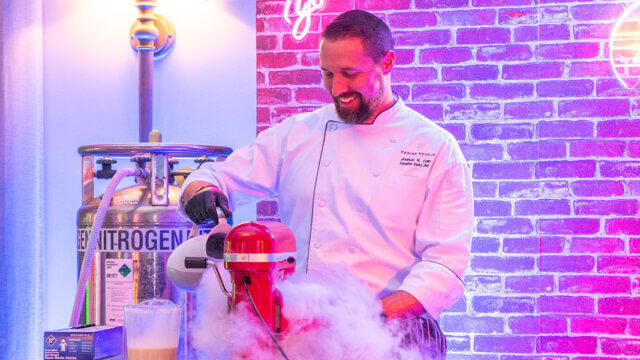The hotel F&B landscape has changed. What guests and locals look for is constantly evolving, with a shift toward independent and creative concepts. Especially in competitive marketplaces, hotels now more than ever must differentiate their offerings.
Phil Colicchio and Trip Schneck, who lead Cushman & Wakefield’s Specialty F&B, Entertainment and Hospitality Consulting practice, agree that chef-driven concepts and hotel partners in major cities are examples of quality differentiation that brands and owners should be seeking if they want to win over millennial and Gen Z consumers.
Some recent partnerships directed by Colicchio and Schneck:
- In Charleston, the team worked with DiamondRock Hospitality Company and the Renaissance Charleston Historic District Hotel to pair the property with celebrity chef Vivian Howard. The partnership resulted in Handy and Hot, a coffee house, and Lenoir, a southern dining concept, both of which have been thriving for more than a year.
- In Boston, the team prepared, organized and oversaw a 10-candidate RFP process on behalf of ownership partners Urban Meritage and AIG that resulted in the selection of Blue Ribbon Restaurant Group to open three concepts in Kenmore Square surrounding the historic Hotel Commonwealth. Colicchio went on to work with ownership to co-draft and negotiate the leasing and financing structure required to complete the project.
- In Nashville, working on behalf of the ownership team at W Hotel, Colicchio and Schneck identified and oversaw the participation of renowned chef and James Beard Award winner Andrew Carmellini at the hotel with two major restaurant concepts. The Dutch’s modern American menu is modeled after Carmellini’s original location in New York, and Carne Mare, which is among one of the most sought-after chef-driven concepts in the U.S.
We got insight from Schneck, who serves as executive managing director, Specialty F&B, Entertainment and Hospitality Group for Cushman & Wakefield, about these F&B concepts and how hotels can stay ahead of the curve:
Can you detail what independent food and beverage concepts are?
We would define independent food and beverage as chef-driven, artisanal, bespoke and localized. There are exceptions where concept-driven restaurants or beverage offerings can be categorized as “independent” so long as they maintain a limited footprint (fewer than 5-10 locations).
Why are these so vital to a hotel? How do they enhance the guest experience?
Differentiation within the hotel vertical has become increasingly more difficult with the consolidation of brands and loyalty programs. The brand consolidation combined with the fact that most hotels in a given competitive set have very similar room products and service offerings makes it nearly impossible to differentiate one hotel asset from another. Bespoke food and beverage offerings can offer a distinction point. We also believe that travelers want to experience the city as a local would. Why eat at the chain restaurant within the hotel when they can have that same meal back home in the suburbs? If executed correctly, a hyper-localized, chef-driven food and beverage offering can be additive to both rate and occupancy.
What exactly does Cushman & Wakefield provide hotels with?
Phil and I lead Cushman & Wakefield’s Specialty Food & Beverage, Entertainment and Hospitality Consulting practice. We work directly with hotel owners and developers to identify, select and engage elevated food and beverage partners for their hotel assets. Our curation approach is carefully tailored to match the right operator with the right hotel group. We spend considerable time underwriting chefs and restaurant operators.
Can you detail some successful hotel partnerships?
Over the past year we have successfully reimagined the food and beverage offerings at the W Nashville (Noho Hospitality and Chef Andrew Carmellini), Charleston Renaissance (Chef Vivian Howard) and the Hotel Commonwealth (Blue Ribbon Sushi) to name a few.
What are younger guests looking for when it comes to hotel F&B?
We’ve noticed that chef-driven, independent cuisine is even more important to the younger generations. Gen Y, Gen Z and even millennials have grown up with the Food Network. They look at chefs as rock stars. As such, they have more refined tastes than previous generations. They also care deeply about how their food is sourced and value experiences over goods and have shown a willingness to spend money on dining
How can hotels meet these needs?
Up until the early 2000s, food and beverage was thought of as the “L” in P&L. Hotel operators chose to focus their attention on the rooms side of the business because that is where the margin was. As some of the more progressive hotel REITS and owners figured out that food and beverage could be used to drive occupancy, differentiate their hotels and generate a profit on their food and beverage operations by outsourcing to well-run chef driven groups, the game changed a bit. Deal structuring is very important. We have seen plenty of ill-constructed third-party food and beverage management contracts, especially early on. Alignment is paramount. Hotels can meet the needs of the next generations of travelers by giving them what they want; responsibly sourced, chef-driven, bespoke food and beverage offerings. It’s tough to do that through traditional leasing of food and beverage spaces to chain restaurants.
What are some of the biggest challenges right now for hotel F&B?
There are practical challenges and there are philosophical challenges. The practical challenges relate to staffing and talent retention on the F&B side. The philosophical challenges relate directly to cultural relevance, meaning, how will the hotel F&B present and remain relevant to consumers, especially to the Millennial and Gen Z guests.
How should owners and operators look to overcome those?
In relation to staffing and talent retention, owners and operators must, of course, provide competitive compensation packages, but they must also allow for creativity to be expressed and rewarded within these F&B outlets. Talent requires inspiration and growth opportunities, in order to flourish. That’s where culturally relevant F&B options become even more important. It’s a holistic approach that should be benefiting the hotel guest, the hotel staff and the food and beverage consumer. An approach that considers the needs and wants of each party involved in the food and beverage experience should be the goal.
What about some opportunities? For hotels that haven’t really incorporated an independent F&B concept but want to, what’s some advice you have for them?
There are clear opportunities for hotel owners and operators to identify “culturally relevant” F&B trends, such as smaller F&B footprints, ethnic variety and fair price points. An example of this would be the Skirt Steak restaurant, which has become popular in New York City. The concept includes a flavorful, yet inexpensive cut of beef, and heaping bowls of frites for only $28, which includes refills. The line is out the door explain the understanding consumers demonstrate for this proposition at a time when that is hard to find ‘a bang for your buck,’ high quality value and experience at a fair price point.
Are you seeing any hotel F&B concept trends? What should owners be on the lookout for?
We are seeing a lot of multiple unit floor plans, which we believe is very forward thinking. Multiple F&B outlets provide different personalities for different parts of the hotel. Rather than a single large dining room, we are seeing smaller spaces that feature alternating cuisines. Of course, everyone is looking for the next “espresso martini,” but if we had that secret, we probably wouldn’t tell anyone.



